Private Enterprise Value readers and podcast listeners frequently ask what I am reading; here’s a quick update.
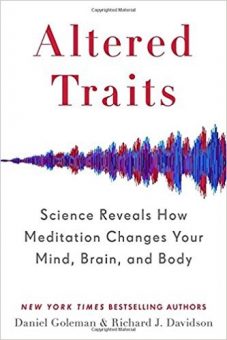 Altered Traits: Science Reveals How Meditation Changes Your Mind, Brain, and Body. (2017). Daniel Goleman and Richard Davidson.
Altered Traits: Science Reveals How Meditation Changes Your Mind, Brain, and Body. (2017). Daniel Goleman and Richard Davidson.
I found this to be a moderately dense read. As a thirty year plus (episodically regular) practitioner of Transcendental Meditation (TM), I found Goleman and Davidson’s description of the current culture of “McMindfulness” to put the current topic in context (besides being entertaining).
Most high-performing Entrepreneur Owner-Managers (maybe all high-performers) experiment with ways to apply more talent, or learning, or practice to increase their performance, but the authors demonstrate that beyond the pleasant states mental exercises can produce, the real payoffs are the lasting personality traits that can result from making regular meditation a habit.
The highest-performing EOM’s (hell, the highest achievers in all domains) will without a doubt be those who have mastered physical and mental recovery and re-pletion, not merely those who apply themselves most effortfully. As Sapiens, we have evolved our nearly 300,000 years as superb hunter-gathers and now we find ourselves…in traffic. We were evolved for a world that no longer exists, yet our Negativity Bias is in full force. We are over-actively vigilant for threats or attacks all around us, and those false positives trip our flight or freeze alarms, and release stress hormones into our systems. One of the great benefits of meditation turns out to be the re-setting of the Negativity Bias.
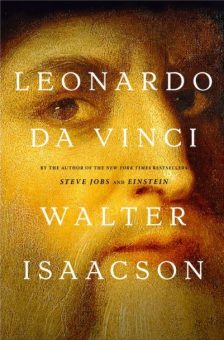 Leonardo da Vinci. (2017). Walther Isaacson.
Leonardo da Vinci. (2017). Walther Isaacson.
Look I might as well come right out and say it, I love Leonardo da Vinci—but after this book, I have developed tremendous animosity for the writing of Walter Isaacson. How could anyone make Leonardo boring? Isaacson sure did. He’s so incredibly process-driven, nit picking, bureaucratic, dry. If you want to know what Leonardo had for breakfast on April 19, 1492 it’s probably in here. But the passion, zest, love of learning, love of life that energized Leonardo? Don’t look for it in Isaacson’s work. To be candid, I found a similar thing when I read Isaacson’s Steve Jobs which was described as the “definitive work.” Hell, I came away feeling that Isaacson is a good enough researcher 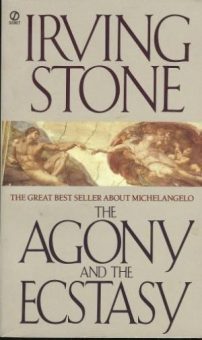 that he probably got most of the facts right, but boy did he dislike Steve Jobs as a person. He makes judgments as opposed to exerting empathy for what might be the stone in their shoe.
that he probably got most of the facts right, but boy did he dislike Steve Jobs as a person. He makes judgments as opposed to exerting empathy for what might be the stone in their shoe.
Want to read a piece about Leonardo’s era that goes the other way (i.e. long on motive and as a historical novel, probably a little less on the dry fact pattern)? I highly recommend Irving Stone’s brilliant The Agony and the Ecstasy on the life of Michelangelo. Michelangelo, Raphael, and Leonardo were the nucleus of fifteenth-century Florentine art. Leonardo was twenty years Michelangelo’s senior and each had his own set vision about art such that their fierce independence led to clashes whenever circumstances brought them face-to-face. TheAgony and the Ecstasy— now that is writing artistry.
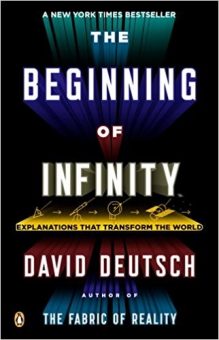
The Beginning of Infinity: Explanations That Transform the World. (2017). David Deutsch
I liked this work, and I had a really hard time sticking to the reading. Deutsch is a formidable thought leader, and really really self-confident of his positions, which is a constant distraction to a critical thinker. (I kept wanting him to preface his sentences with “in my opinion”). Essentially, this work describes why we should all be rational optimists. For the past several hundred years in the West (since the Enlightenment), science and rational thinking have been changing things for the better. Deutsch believes we are just beginning an era of increasing progress that has no end. Here’s a provocative quote:
“Optimism is, in the first instance, a way of explaining failure, not prophesying success. It says that there is no fundamental barrier, no law of nature or supernatural decree, preventing progress. Whenever we try to improve things and fail, it is not because the spiteful (or unfathomable benevolent) gods are thwarting us or punishing us for trying, or because we have reached a limit on the capacity of reason to make improvements, or because it is best that we fail, but always because we didn’t know enough, in time. But optimism is also a stance towards the future, because nearly all failures, and nearly all successes, are yet to come.”
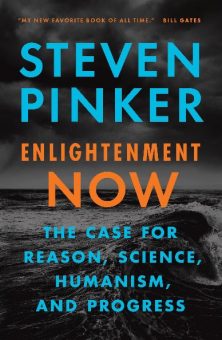 Enlightenment Now: The Case for Reason, Science, Humanism, and Progress. (2017) Steven Pinker.
Enlightenment Now: The Case for Reason, Science, Humanism, and Progress. (2017) Steven Pinker.
Definitely didn’t plan it this way, but it turns out two hard science geeks Deutsch (physicist member of the Royal Society), and Pinker (visual cognition and psycholinguistics) arrive at essentially the same conclusions— that our constant exposure to the constantly negative media and un-social networks give us an incredibly distorted context from which to view the world. Pinker’s new work is filled with facts and figures. I loved the raw data allowing the reader to make their own discoveries and draw their own conclusions. Worldwide, we have never had it so good and we owe tremendous gratitude to the generations who got us here. Neither Pinker nor Deutsch seems to have any anxiety about being politically correct and that makes them, to me, even more attracting.
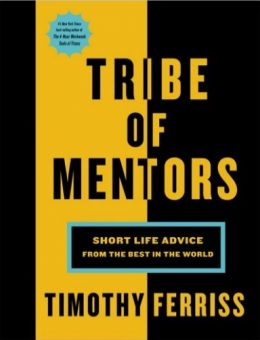 Tribe of Mentors: Short Life Advice from the Best in the World. (2017). Timothy Ferriss.
Tribe of Mentors: Short Life Advice from the Best in the World. (2017). Timothy Ferriss.
I first met Tim Ferriss at the TED 2014 Conference in Vancouver, and I suppose I had read the interesting (but unfortunately titled) The 4-Hour Workweek back in 2009 when my friend Guy Horgan generously gave me a copy.
You just gotta love Tim, right? Here is a guy who, by his behavior, absolutely defies compartmentalization, and keeps pushing the envelope in many, many domains. I so love that and admire it. So, Tribe is a series of questions with a similar theme being answered by people Tim considers to be outstanding (or at least interesting) in their domains. They include actors, musicians, performers of all stripes, authors, athletes, entrepreneurs, and others whose answers to his questions Tim deems worthy. If you listen to his podcast, you may recognize many of the names. I enjoy just flipping through the book and stopping to read a three or four-page summary wherever the lightning strikes me. Lots of learning from “damn I f’ed that up, too!”, to, “whoa that sounds like a good habit to cultivate.”
Edited and produced by Mari Lister.
© 2024 Bigelow LLC. All rights reserved.

